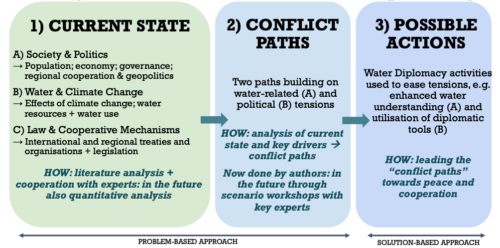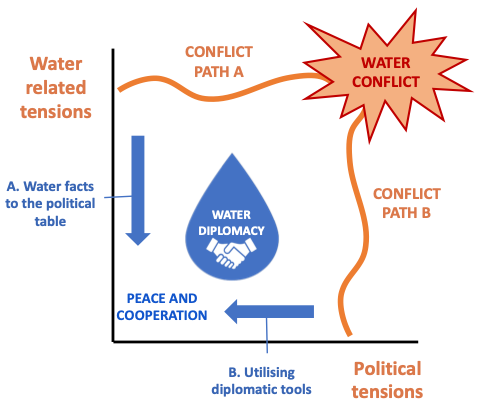Tensions over water resources are expected to increase globally due to the effects of climate change, population growth, urbanisation and related water scarcity. Water diplomacy can complement existing water cooperation activities through its focus on the ‘political’ and utilisation of diplomatic negotiation tools, facilitating peaceful solutions to conflicts over shared waters. The primary objective of this study was to establish an analytical framework for water diplomacy and test it with case studies from Central Asia and Iraq.
Background and Context
My work began in October 2018 when I was hired as a research assistant to the Water and Development Research Group (WDRG) at Aalto University. My task was to conduct a water diplomacy analysis commissioned by the Ministry for Foreign Affairs of Finland (MFA) together with experts from the University of Eastern Finland (UEF). This analysis would then form the backbone of my master’s thesis: Water Diplomacy – Establishing an Analytical Framework for Water Diplomacy with Case Studies from Central Asia and Iraq. Marko Keskinen worked as my supervisor with Olli Varis and Antti Rautavaara being the advisors. Antti was also the coordinator of the MFA project.
The case studies were chosen in a working session held together with several relevant stakeholders, such as ministry officials, ambassadors, organisation representatives and university experts. The MFA later announced the decision to choose Central Asia and Iraq for the analysis. At this point my supervisor Marko Keskinen and I decided that the crux of my thesis would be to establish the analytical framework, which could be used for finer scale regional and national water diplomacy analysis, i.e. the case studies. The case study regions were studied together with colleagues Tuula Honkonen and Antti Belinskij (UEF) while Joseph Guillaume (WDRG) provided quantitative data on future water scarcity with the Water Scarcity Atlas.
Establishing the Framework
The analytical framework was established through studying the research context, utilising a simplified scenario process as well as identifying and formulating key elements for a water diplomacy analytical framework.
First, the context study was used to create the following definition for multi-track water diplomacy to assist in the analysis: “Water diplomacy is a process that provides means to prevent and mitigate water-related political tensions by making simultaneous use of water know-how and diplomatic tools and mechanisms. In this way, water diplomacy complements water cooperation through its focus on the ‘political’ and acknowledgement of the differing interests of relevant actors.”. (Salminen et al., 2019)
The aim of the analytical framework for water diplomacy is to prevent internal and external conflicts by building capacity and reliable networks between actors and by identifying solutions to water related conflict situations through diplomatic tools and technical knowledge on water resources (Schmeier, 2018) (van Genderen & Rood, 2011). In order to establish a functioning analytical framework, we identified the following key steps (Figure 1):
- Analysing the Current State of the region in question
- Creating Conflict Paths to identify root causes of conflict
- Identifying Water Diplomacy Actions to counter the Conflict Paths

As the study concentrated on regional and national contexts, a new scope was required to understand the current situation in the case study regions, with an emphasis on societal context (Islam & Susskind, 2013). In order to satisfy relevant security, diplomacy and water aspects, the following three themes were chosen for a more detailed analysis of the current state of the case study regions: i) society and politics, ii) water and climate change and iii) law and cooperative mechanisms.
The logic of establishing the Conflict Paths and related water diplomacy actions is presented in Figure 2. In Conflict Path A, a conflict escalates through water-related tensions (i.e. water getting to politics), while in Conflict Path B the political tensions make water use political (Keskinen et al., 2014). Similarly, water diplomacy actions are then either water-related i.e. linked to increased water understanding (A) or diplomacy-related i.e. utilisation of diplomatic tools and mechanisms also in water cooperation (B) (Keskinen et al., 2014). The timeframe of the conflict paths and actions is set to 2030 to provide long enough timeframe and also correspond with the deadline of the UN SDGs.

Together these actions form a possible water diplomacy strategy for the case study regions, which aims to bring the paths back towards peace and cooperation. As with the conflict paths, the possible actions are divided into two categories: measures that bring water related know-how to the political table (A) and measures that strengthen political cooperation and the use of diplomatic tools in water related cases (B). The proposed actions are mainly supporting or strengthening measures that build upon existing investments and projects, but they can also include completely novel ideas. It should be highlighted, that the recognized actions are indicative only as they provide just the authors’ view building on the current state analysis and Conflict Paths.
Context-specific results from the case studies highlight the potential and limitations of water diplomacy efforts to prevent and mediate water-related conflicts in Central Asia and Iraq. For example, in Central Asia there is a clear need to renew outdated regional water treaties but a lack of trust between actors has hindered progress. In Iraq the complete lack of active water cooperation is a crucial starting point for water diplomacy actions. The rest of the case study specific findings can be studied from an English summary of the MFA report, available here: bit.ly/Waterdiplomacy.
The findings of this thesis complement recent global analyses and provide a viable analytical framework for regional and national water diplomacy analysis, that can be used anywhere in the world. The approach is particularly suited for developing countries or regions where climate change, rapid population growth and societal context are key factors.
Future Steps
The study highlights the multifaceted nature of water cooperation, complementing it with a water diplomacy view. The results indicate the potential for more thorough use of water diplomacy tools such as mediation and arbitration to complement on-going cooperation and governance activities. Water diplomacy can also be the most feasible way forward in heavily politicized contexts such as Iraq, paving way for long-term water cooperation. Further focus should be put on developing the analytical framework by utilising more detailed quantitative analyses as well as interviews and workshops with local experts.
The analysis findings were presented in March 2019 at the Finnish Institute of International Affairs (FIIA) and the final version of the report commissioned by the MFA was published in April 2019 (available in Finnish here: bit.ly/Vesidiplomatia). The results were further discussed in sessions of the Finnish water diplomacy network established during the project. I also presented my thesis at the World Water Week in the seminar: “Water governance with and for all: Is it working?” in August 2019. Details from my experiences in Stockholm can be found here.
Acknowledgements
Finally, I would like to express my sincere gratitude to the many people that have helped me complete the report and thesis. I would especially like to thank my thesis supervisor Marko Keskinen, my advisors Olli Varis and Antti Rautavaara as well as Tuula Honkonen, Antti Belinskij and Joseph Guillaume who provided invaluable assistance throughout both projects. I also want to give a shout out to the SRC-funded Winland research project and the Ministry for Foreign Affairs / UniPID as well as Aino & Kaarlo Tiisalan rahasto, Maa- ja vesitekniikan tuki ry and Sven Hallin Research Foundation sr for their financial support.
I am proud and humbled to have been a part of this project and it feels like my working environment was as good as it gets. The Water and Development Research Group made me feel welcome since the first day and provided much needed peer support during lunch and coffee breaks. Especially the final days of writing were very intense, but always enjoyable thanks to my fellow thesis sufferers Anni Juvakoski, Enni Huotari and Roope Kouki. It’s the end of a long but enjoyable road and I am grateful to have shared it with all of you.
Tiivistelmä suomeksi
Valtioiden välisten veteen liittyvien jännitteiden arvioidaan yleistyvän ilmastonmuutoksen, väestönkasvun, kaupungistumisen ja niistä muodostuvan kasvavan veden niukkuuden johdosta. Vesidiplomatian tavoitteena on hyödyntää diplomatiatyökaluja vesivaroihin liittyvien konfliktien ennaltaehkäisyssä ja sovittelussa sekä täydentää olemassa olevia veteen liittyviä yhteistyömekanismeja. Diplomityöni tavoitteena oli kehittää analyyttinen viitekehys tarkemmalle vesidiplomatia-analyysille alueellisella ja kansallisella tasolla sekä arvioida sen toimivuutta kahdella tapaustutkimuksella, joiden kohteina olivat Keski-Aasia ja Irak. Analyysi perustui Suomen ulkoministeriön tilaamaan ”Vesidiplomatia – ennakoivaa rauhanvälitystoimintaa” tilaustutkimukseen, joka valmistui maaliskuussa 2019 (saatavilla: bit.ly/Vesidiplomatia)
Analyysin aikana kehittämämme viitekehys koostuu kolmesta osasta: i) tutkittavan alueen nykytilan kartoitus ii) kahden veteen liittyvän konfliktipolun luominen ja iii) suositeltujen toimenpiteiden muodostaminen. Nykytilan arvio jaettiin niin ikään kolmeen osaan: yhteiskunta ja politiikka, vesi ja ilmastonmuutos sekä oikeus ja yhteistyömekanismit. Mahdolliset konfliktipolut kehitettiin vuoteen 2030 niin, että toisen lähtökohtana on veteen liittyvät jännitteet ja toisen poliittiset jännitteet.
Tapaustutkimuksien tulokset korostavat vesidiplomatiaan liittyvien toimenpiteiden mahdollisuuksia ja rajoituksia veteen liittyvien konfliktien ennaltaehkäisyssä ja rauhanvälityksessä Irakissa ja Keski-Aasiassa. Esimerkiksi Keski-Aasiassa on suuri tarve uudistaa vanhentuneita vesisopimuksia, mutta valtioiden välinen luottamuksen puute on hidastanut kehitystä. Irakissa vesidiplomatiaa pitäisi lähtökohtaisesti hyödyntää rajat ylittävän vesiyhteistyön aloittamiseksi naapurivaltioiden välillä. Analyysi täydentää viimeaikaisia globaaleja vesijännitteisiin liittyviä tutkimuksia sekä alueellisia valtioiden välisiin yhteistyömekanismeihin ja konflikteihin liittyviä selvityksiä.
Tuloksien perusteella vesidiplomatian työkaluilla on paljon mahdollisuuksia täydentää olemassa olevia yhteistyömekanismeja ja hallinnollista kehikkoa. Vesidiplomatia voi olla toimiva tapa edetä vahvasti politisoituneissa konteksteissa (esim. Irak), joissa saavutettu vesiyhteistyö voi toimia muiden poliittisten jännitteiden lievittäjänä. Analyyttistä viitekehystä tulee kehittää tulevaisuudessa mm. läpikotaisemmalla kvantitatiivisella analyysillä sekä vuoropuhelulla ja työpajoilla paikallisten asiantuntijoiden kanssa.
Tämä työ tehtiin yhdessä. Erityisesti haluaisin kiittää valvojaani Marko Keskistä, ohjaajiani Antti Rautavaaraa ja Olli Varista, Itä-Suomen yliopiston Tuula Honkosta ja Antti Belinskijiä, WDRG:n Joseph Guillaumea sekä kaikkia teitä, jotka olitte tukenani työn aikana. Tästä on hyvä jatkaa.
M.Sc. (Tech.) Erik Salminen finished his master’s thesis on water diplomacy for the Water and Development Research Group at Aalto University in August 2019.
Sources
Islam S, Susskind L. Water Diplomacy – A Negotiated Approach to Managing Complex Water Networks. 2013.
Keskinen M, Inkinen A, Hakanen U, Rautavaara A, Niinoja M. Water Diplomacy: Bringing Diplomacy into Water Cooperation and Water into Diplomacy. In: Hydro Diplomacy: Sharing Water Across Borders. 2014. Academic Foundation.
Schmeier S. What is water diplomacy and why should you care? 2018. Global Water Forum. Available: http://www.globalwaterforum.org/2018/08/31/what-is-water-diplomacy-and-why-should-you-care/
Salminen E, Honkonen T, Belinskij A, Keskinen M. Vesidiplomatia – ennakoivaa rauhanvälitystoimintaa. 2019. Aalto University, University of Eastern Finland. Available: bit.ly/Vesidiplomatia
van Genderen R, Rood J. Water Diplomacy: A Niche for the Netherlands? 2011. Netherlands Institute of International Relations.

